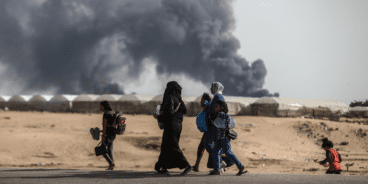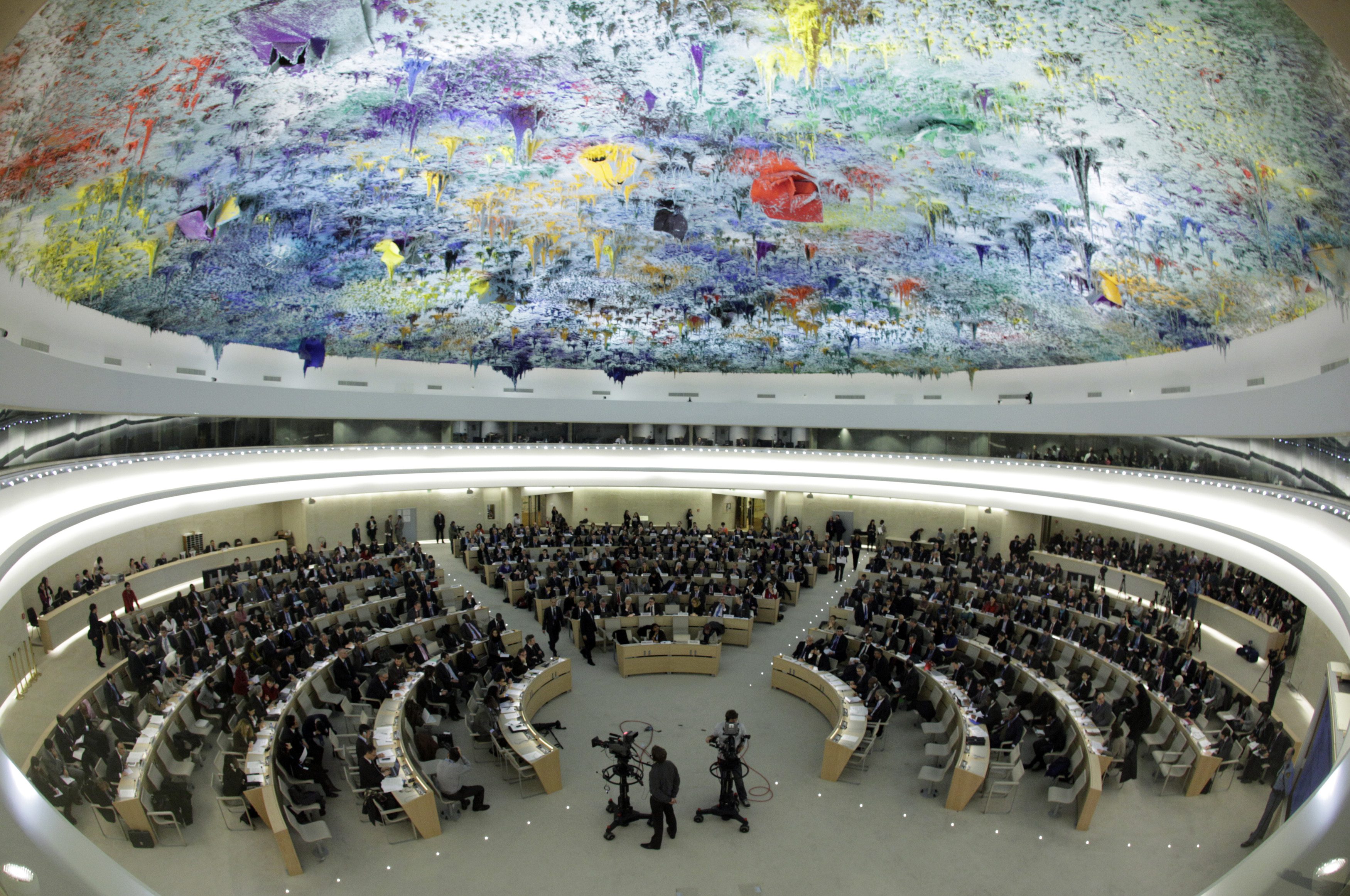
Statement delivered on behalf of the Group of Friends of R2P at the UN Security Council Open Debate on Women, Peace and Security: Sexual Violence in Conflict
The enclosed statement was delivered by Her Excellency Ambassador Alya Ahmed S. Al-Thani Permanent Representative of the State of Qatar to the United Nations on behalf of members of the Group of Friends of R2P at the UN Security Council Open Debate on Women, Peace and Security: Sexual Violence in Conflict
Mr. President,
I have the honor of delivering this statement on behalf of 51 members of the Group of Friends of the Responsibility to Protect*, co-chaired this year by Denmark and the State of Qatar.
The Group would like to thank Germany for organizing today’s important Open Debate. I also would like to extend our gratitude to Nobel Peace Prize winners Dr. Denis Mukwege and Ms. Nadia Murad for their informative briefings and persistent efforts to end the use of sexual violence as a tactic of war and armed conflict.
Mr. President,
As the Secretary-General noted, sexual violence in conflict is a “historically hidden crime” that requires early warning and swift responses. Sexual violence, including rape, is not just a by-product of war, but increasingly employed as a deliberate strategy by state and non-state actors to retaliate against, terrorize, intimidate, control and displace civilians. Such acts may amount to crimes against humanity, war crimes, or genocide. Further, sexual violence in conflict significantly exacerbates and prolongs situations of armed conflict, destroys the social fabric of communities and impedes peacebuilding and reconciliation efforts.
Sexual violence is a pervasive facet of many conflicts today, claiming thousands of victims every year. In South Sudan, sexual violence in conflict remains rampant, often used as collective retribution against ethnic rivals. The United Nations Mission in South Sudan reported 1,157 cases of sexual violence during 2018. And these are only the reported cases in a context of notoriously underreported incidents. Similarly, as Ms. Murad has attested, the so-called Islamic State in Iraq and the Levant has systematically committed rape and sexual violence against Yazidi women and girls, which the Independent International Commission of Inquiry on Syria has characterized as war crimes, crimes against humanity and genocide.
As it is the primary responsibility of member states to protect their populations against genocide, crimes against humanity, war crimes and ethnic cleansing, including those involving rape and sexual violence, the Group of Friends of the Responsibility to Protect would like to stress the following points:
- First, strengthening the capacity of national institutions is critical to ensuring accountability for such crimes in the past, and to preventing and deterring such crimes in the future. It is of utmost importance that states put in place and enforce legislative and institutional procedures to comprehensively address sexual violence in conflict and prevent its occurrence. Despite the increased awareness of the issue, most incidents of mass rape continue to be met with impunity. States have the primary responsibility to investigate and prosecute crimes committed within their jurisdiction, and national accountability efforts should be encouraged and supported, including through the strengthening of judicial cooperation between states. Fact-finding missions, investigative mechanisms, commissions of inquiry, hybrid and international courts and tribunals provide complementary avenues for accountability when and where options under domestic law prove insufficient.
- Second, there is an urgent need for a survivor-centred approach to support the needs of victims of sexual and gender-based violence before, during and after situations of conflict. The international community should support provision of appropriate medical, psycho-social and socio-economic reintegration assistance and services to survivors in order to prevent revictimization and restore the social fabric of societies after conflict.
- Third, at the heart of sexual violence lies a disregard for human rights, as well as the perpetuation of gender inequality and systematic discrimination. Sexual violence in conflict must be addressed with the active and equal participation of women in identifying prevention mechanisms and holistic, rights-based solutions that address their needs. It is equally important to continue to engage men and community leaders to play a positive role in addressing gender stereotypes and societal exclusion mechanisms.
- Fourth, the UN Security Council could and should make better use of targeted sanctions to prevent and halt sexual violence – including through basing listing criteria on involvement in the perpetration of sexual violence. In this context, the Special Representative of the Secretary-General on Sexual Violence in Conflict and Panels of Experts should consistently brief and give information on individuals or entities responsible for committing sexual violence to sanctions committees, encourage member states to list them, and recommend targeted sanctions.
- Lastly, training on gender issues, preventing sexual exploitation and abuse, and addressing sexual violence in conflict should be a mandatory component of national military and police training, as well as pre-deployment and in-mission training of all UN peacekeeping and civilian personnel. In this regard, we support the UN Zero-tolerance policy on sexual exploitation and abuse and welcome the Secretary-General’s initiative on the Voluntary Compact between the UN and Member States to prevent and eliminate sexual exploitation and abuse.
Mr. President,
Sexual violence in conflict need not be an inevitable side effect of armed conflict, it can be prevented and stopped. While significant normative progress has been achieved in recent years, it is also clear that words on paper are not yet matched by facts on the ground. In this regard, it is imperative that the Members of the Security Council take timely and decisive action aimed at ending and preventing sexual violence in conflict, if and when they may amount to atrocity crimes.
In closing, the Group of Friends of R2P would like to recognize and pay tribute to the important work accomplished by Dr. Mukwege and Ms. Murad, including providing critical medical and psycho-social and socioeconomic reintegration support to the survivors of sexual violence in conflict and addressing impunity for these heinous crimes.
We would like to ask how we, as members of the R2P community, can more efficiently integrate gender considerations and prevention of sexual violence into our work.
Thank you.
*Argentina, Australia, Bangladesh, Belgium, Bosnia & Herzegovina, Botswana, Canada, Chile, Costa Rica, Cote d’Ivoire, Croatia, Czech Republic, Denmark, European Union, Finland, France, Germany, Ghana, Guatemala, Hungary, Italy, Japan, Liberia, Liechtenstein, Luxembourg, Mali, Mexico, Morocco, Mozambique, Netherlands, New Zealand, Nigeria, Norway, Panama, Peru, Qatar, Republic of Korea, Rwanda, Romania, Senegal, Sierra Leone, Slovakia, Slovenia, South Sudan, Spain, Sweden, Switzerland, Tanzania, United Kingdom, United States and Uruguay.
Related Content


Joint Statement by the Group of Friends of R2P delivered during the Interactive Dialogue with the UN Working Group on Enforced Disappearances
